When life gets busy, it’s easy to fall into the rut of relying too heavily on caffeine to get you through the day.
While it works in the short-term, can have devastating results down the line – leading to poor focus, fatigue, and a lower mood. Rather than reaching for your sixth cup of coffee or gulping down an energy drink, an ancestral superherb might be just what you need.
Rhodiola rosea (referred to as the Arctic root) grows at high altitudes in Europe and Asia. It’s classified as an adaptogen (a substance that supports the body during times of stress).
Want to train your brain to be happier and healthier?
Click here to receive our FREE 7-Day Meditation Challenge!
For millennia, rhodiola has been used by a variety of ancestral cultures to support energy and vitality. In fact, it was used by the Vikings in the 10th century to enhance physical capacity. It was also used by indigenous sherpas in the Himalayas to cope with the high altitude.
While these anecdotes are interesting, the real question is: Does science support the theory that rhodiola can increase your resiliency during times of stress? Or it is just all hype?
Rhodiola Benefits

Let’s take a closer look to find out if rhodiola should be your go-to herb for fighting off stress – when constantly on the run or intensely training.
Rhodiola Can Improve Brain Function
Long days in the office and never-ending emails can increase stress levels. Cortisol (the body’s primary stress hormone) increases during times of stress. It can damage the hippocampus area of the brain, inhibiting the conversion of memory from short-term to long-term. In short, when chronic stress is high, you start forgetting things (where you left your cell phone, what to pick up for dinner, or even your client’s first name). If this situation sounds familiar, chances are that your cortisol levels are on the rise, and your brain is suffering the consequences.
Adaptagens (such as rhodiola) can therefore be a useful tool to help get you through a mentally or physically challenging work period. Studies show that rhodiola improves cognitive function by reducing overall fatigue levels. However, note that all the trials didn’t show benefits. (1, 2, 3, 4) In clinical practice, I find that clients do best when they acutely take rhodiola for 2-4 weeks during times of stress, then back off once the stressor has subsided.
Rhodiola Can Alleviate Anxiety
It’s very easy to live in a “future state”: you’re constantly scheduling and planning your next tasks and deadlines. Unfortunately, this type of mindset can predispose you to anxiety. Rhodiola has shown the benefit of alleviating stress.
A recent study (over a 10-week period) at UCLA investigated the effects of 340 mg of supplemental rhodiola on adults (between the ages of 34-55) who’d been diagnosed with generalized anxiety disorder. The researchers found significant improvements in their Hamilton Anxiety Rating Scale scores, reflecting an amelioration in their symptoms. (5) If you’re prone to anxiety when your schedule gets too hectic (or your life is too busy), rhodiola can provide an added support to offset these effects.
Rhodiola Can Improve Mood
In athletes, one of the first signs of overtraining is low mood. Chronic high-intensity training (without tapering) can quickly lead to elevated stress levels and nervous-system fatigue. These effects can also occur when you’ve working long hours for weeks and weeks on end – without a mental or physical break from the task. Rhodiola has been shown to increase the sensitivity of brain cells (i.e., neurons) to two key neurotransmitters (dopamine and serotonin). Both of them are essential for optimal cognitive function, memory, and mood.
Recently, a study compared the effectiveness of rhodiola supplementation (versus a commonly prescribed antidepressant) on mood and associated symptoms. The researchers found that while medication was superior, rhodiola did provide substantial benefits (and significantly fewer side-effects than the medication). (6) While there’s significant research that rhodiola increases a low mood, not all studies show improvement.
During times of stress, the benefit for busy people is that rhodiola can provide a nice support to maintain mood and vitality. However, if you struggle with chronic or severe depression, it’s important to talk to your doctor about the most effective strategy for you.
Rhodiola Can Boost Athletic Performance
Constant stress can kick up cortisol levels and derail your training performance. Adding rhodiola to your regime (during stressful periods or intense training blocks) can provide serious training benefits. Research shows that rhodiola supplementation has the ability to improve endurance and performance by improving the breath rate and reducing the heart rate (during maximal exertion). It can also reduce perceived exertion (i.e., the exercise feels easier). (7, 8)
Those are pretty nice benefits to keep your gym performance on point while you’re busy with work or training for a big competition. These benefits can be major if your work or training schedule don’t line up well, so you’re forced to exercise or work on less-than-adequate sleep.
Could you use this approach for months on end? Once again, the benefits for rhodiola on endurance seem best in the short-term. Long-term studies on elite endurance athletes found that chronic supplementation failed to produce any benefits on maximum heart rate, perceived exertion (i.e., Borg scale), maximum aerobic capacity (i.e., VO2 max) or cycle time. (9) In short, you’ll only get the benefits for a limited time, so make sure you’ve planned ahead and scheduled more sleep and recovery in advance.
What’s the Ideal Dose of Rhodiola?
If rhodiola sounds like it might be a good fit for you, start with 100-200 mg a day upon waking up (on an empty stomach). Be sure to always look for a standardized extract. Products containing 2-3% rosavin and 0.8-1% salidroside exert the majority of the beneficial effects. If you feel better after a couple of weeks, you could add a second dose (of 100-200 mg) around midday.
However, be sure to avoid taking rhodiola in the evening or before bed, as it can lead to insomnia. Remember, it’s always best to cycle your supplements (especially herbal ones). For every month “on”, take a month off. Alternatively, take one week off after every 3 weeks of supplementation.
Talk to a qualified doctor, naturopath, or functional medicine practitioner if you’re taking any medications (or have a medical condition) that may interact with the herbs.
Is It Possible To Take Too Much Rhodiola?
Just because something is “natural,” that doesn’t mean it can’t harm you. For most people, a typical dose of 100-400 mg will provide benefits. While studies show an intake of up to 800 mg, high doses can cause adverse reactions. If you excessively or chronically ingest rhodiola, the potential side effects can include dry mouth, increased blood pressure, dizziness, and increased anxiety. (If you have hypertension, rhodiola should only be taken under the supervision of your doctor or naturopath.)
The Bottom Line
Life gets busy. Rather than reaching for more caffeine or succumbing to sugar cravings, give your body an ancestral superherb boost. While there are no “magic bullet” fixes to stress, rhodiola can help increase your resiliency, boost cognitive function, fight off symptoms of anxiety and depression, and support physical performance during times of stress.
If rhodiola sounds like a good fit for you, add it to your regime when you know stress levels will be on the rise. But remember, nothing beats a healthy diet, good sleep, and proper exercise.
And if you’re taking any medications (or have a medical condition), chat with a qualified doctor, naturopath, or functional medicine practitioner before taking rhodiola.
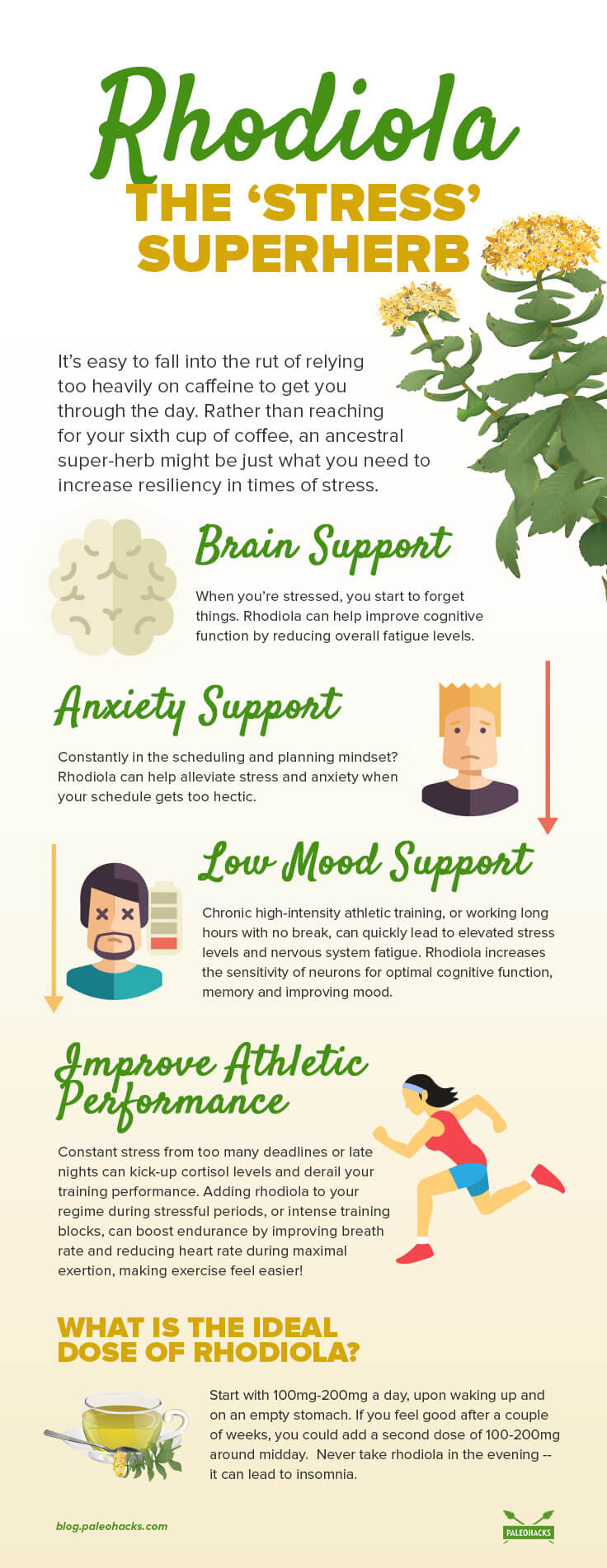


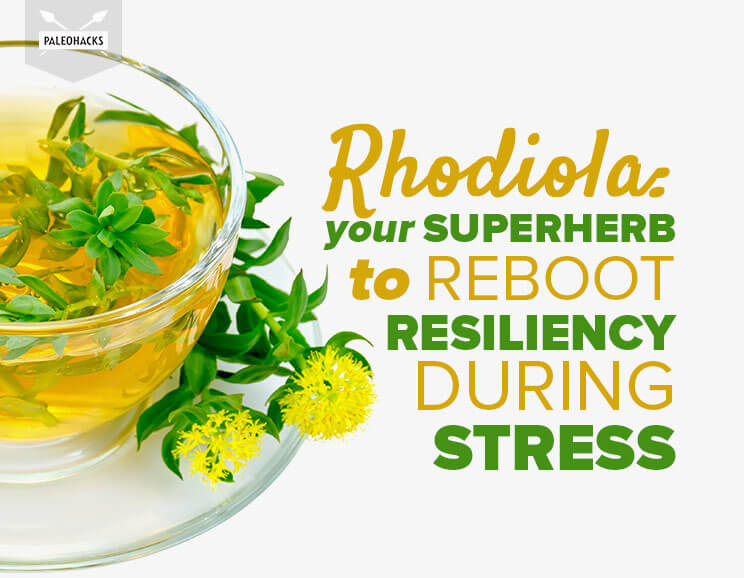
 Coconut-Crusted Chicken Fingers with Honey Dijon Dip
Coconut-Crusted Chicken Fingers with Honey Dijon Dip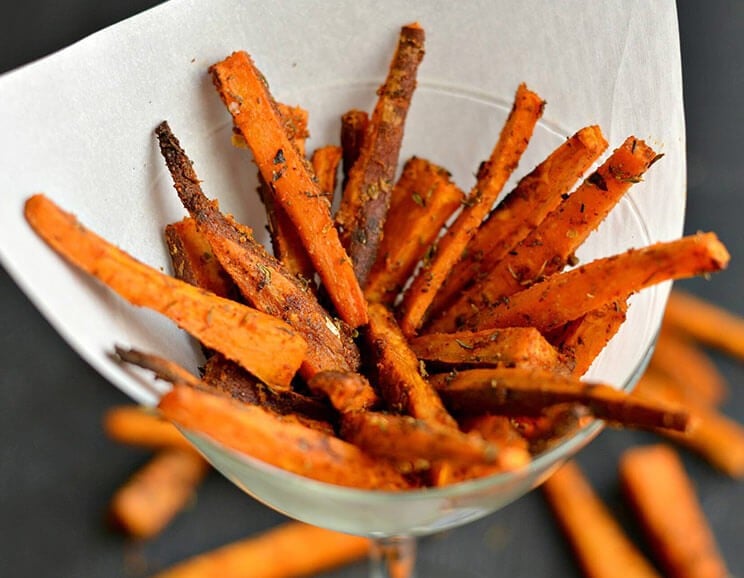
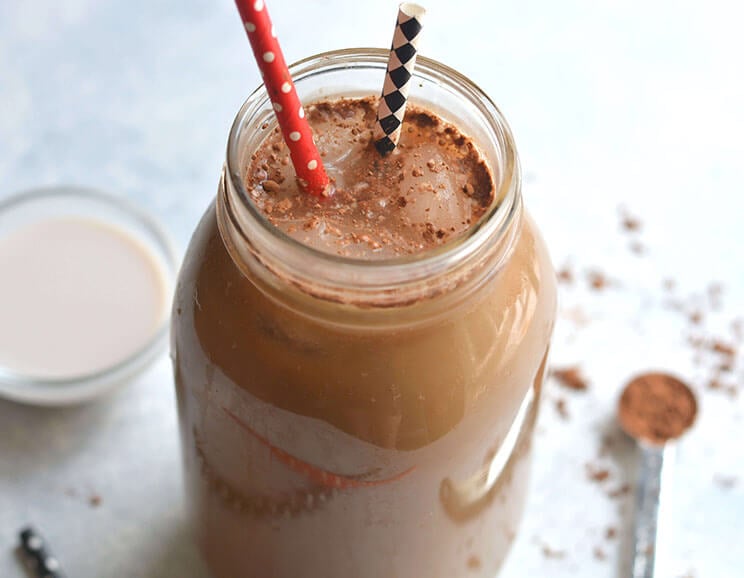



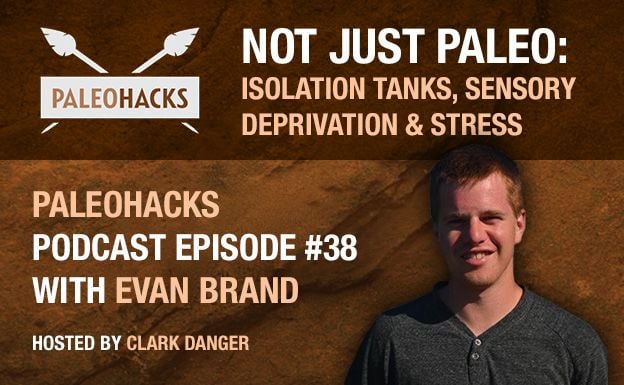



Show Comments